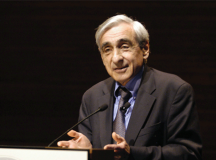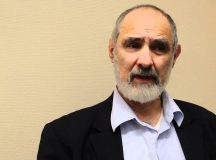Russell Shalev argues that human rights movements cannot adequately address anti-Jewish discrimination, harassment or violence without recognising the mutual connection between Judaism and Zionism, and therefore between anti-Zionism and antisemitism. Judaism, he points out, is at once a religion and a nation. Since the inception of the Jewish people, Zion, the Land of Israel, and a national covenant have formed a central role in Jewish self-understanding. The modern Zionist movement is merely a reformulation of the ancient Jewish yearning for national renewal in its ancient homeland. Beginning in the Emancipation, Jewish equality was often conditional on the renunciation of these national ties. Contemporary anti-Zionism is an ideological heir to this antisemitic pressure. Anti-Zionist antisemitism demonises Jewish national identity, marginalises Jews, and legitimizes exclusion, hate and even violence against Jews regardless of their political affiliation, and sometimes even regardless of their personal connection or support for Zionism or the State of Israel.
I once called Zionism an infinite ideal, and I truly believe that even after we achieve our land, the land of Israel, it will not cease to be an ideal. Zionism, as I see it, entails not only an aspiration for a piece of land legally ours, but also for moral and spiritual integrity. – Theodore (Binyamin Ze’ev) Herzl
The Land of Israel was the birthplace of the Jewish people. Here their spiritual, religious and political identity was shaped. Here they first attained to statehood, created cultural values of national and universal significance and gave to the world the eternal Book of Books.
After being forcibly exiled from their land, the people kept faith with it throughout their Dispersion and never ceased to pray and hope for their return to it and for the restoration in it of their political freedom. – Israeli Declaration of Independence
Introduction
The horrors of the Second World War, along with the success of the civil rights movement in Western Democracies, have largely convinced mainstream society of the unjust and illegitimate nature of racial discrimination. Especially in the past few years, political and grassroots movements dedicated to eliminating racial injustice and intolerance have grown in influence in democracies worldwide. At the same time, the new millennium has seen a revival in global antisemitism, often called ‘the world’s oldest hatred’. In the US in 2020, attacks against Jews were 60 per cent of all hate crimes against religious groups, despite Jews only comprising 1.7 per cent of the population. In France in 2019, antisemitic attacks were the majority of racist crimes, despite Jews comprising less than 1 per cent of the population.
Strangely, despite the laudable principles of human rights and anti-racist movements, many of these movements are ideologically anti-Zionist, thereby excluding most Jews from their ranks. This is ironic given that many Jews are deeply motivated by visions of social justice and equality. Jews who point out these blind spots regarding Jews and Israel are often met with the insistence that activists ‘have nothing against Jews – only Israel and Zionism’. Many well-meaning people are genuinely confused or unaware of the connection between Jews and Zionism.
Anti-Zionism is distinct from critique or criticism of the State of Israel in that it posits that the State of Israel is fundamentally illegitimate and must ultimately be dismantled. Anti-Zionism holds that Zionism, the Jewish national movement dedicated to establishing and maintaining a state for the Jewish people in the land of Israel, is unlike any other nationalist movement. According to anti-Zionists, Zionism is at its core racist, militaristic and oppressive. A common feature of anti-Zionist discourse is the comparison between Zionism and Nazism, thus associating Zionism with the ultimate symbol of evil and hatred in the contemporary Western world. Anti-Zionism demonises the Jewish state. It is not seen as a normal state, but rather one ‘born in sin’ – contaminated by imperialism and colonialism, maintained through settler violence and racial supremacy[1]. The State of Israel therefore has no legitimate history, rights or existence. Anti-Zionism frequently employs classical antisemitic tropes and attaches anti-Jewish stereotypes to the State of Israel, its citizens and supporters. Anti-Zionists are extremely opposed to the recognition of the antisemitic nature of anti-Zionism, claiming that this would silence criticism and hurt their freedom of expression.
This essay will explain the inherent fallacy in separating Jewish identity and Zionism. A truly inclusive and tolerant human rights movement must have room for Zionists. By insisting on a narrow understanding of Jews as simply a religious group, movements dedicated to anti-discrimination fail to adequately protect Jews and combat antisemitism. This paper will demonstrate that, in addition to their religious aspects, Jews are simultaneously a people. Zionism is a modern reformulation of Jewish national identity, which has formed an integral part of Judaism since its inception. Moreover, anti-Zionism forms part of a long tradition that demands Jewish assimilation and the abandonment of their national identity as a price for equality. Only by acknowledging and overcoming these anti-Jewish attitudes can human rights movements become truly inclusive to Jews. I will then demonstrate the catastrophe that anti-Zionism has historically caused Jewish life in Eastern Europe and the Middle East, showing the very real dangers that anti-Zionism presents to Jews worldwide through its attempts to ostracise, marginalise and exclude Jews from public life. Finally, I address the canard that recognition of the antisemitic nature of anti-Zionism prevents criticism of Israel.
Zionism – An Integral Part of Judaism
Zionism is the Jewish national liberation movement, dedicated to the re-establishment of a Jewish state in the Jewish people’s ancestral homeland, Eretz Yisrael (the Land of Israel). Zionism at its core is a modern expression of millennia of Jewish longing to return to the Land of Israel and to reconstitute Jewish national life there. As such, Zionism is an inherent part of Jewish identity, both ancient and modern. Zion literally refers to the central mountain at the heart of Jerusalem upon which the city and the Holy Temple were founded, and figuratively refers to Jerusalem, the Land of Israel and even the Jewish people.[2]
Judaism, unlike Christianity and Islam, is both a nation and a religion. Jews historically have referred to themselves as Am Yisrael, the people of Israel, held together by a common covenant with God and fellow Jews. Mutual responsibility, familial and brotherly ties, and common identity have characterised Jewish communities throughout the ages, as Jews traditionally have seen each other as descendants of shared ancestors and tied together by a collective faith and destiny. This self-understanding can be seen in the traditional Jewish prayer: ‘Our brethren, the entire House of Israel, who are distress or danger… may the Omnipresent One have mercy on them and take them out from distress to relief, darkness to light and oppression to freedom.’[3]
The Jewish people have lived in the Land of Israel since ancient times, both according to the biblical narrative and modern historical research. Jews maintained hundreds of years of national sovereignty and independent statehood in the Land of Israel, with their capital in Jerusalem (or Zion). These Jewish states were brought to their end by the Babylonian empire in the 6th century BCE and the Roman empire in the 1st century CE. These historical catastrophes left an indelible mark on Jewish national consciousness, and the poignancy of the pain and longing of the Jewish exiles can be felt in the words of the Psalmist:
By the rivers of Babylon, there we sat, we also wept when we remembered Zion. On willows in its midst we hung our harps. For there our captors asked us for words of song and our tormentors [asked of us] mirth, ‘Sing for us of the song of Zion.’ How shall we sing the song of the Lord on foreign soil? If I forget you, O Jerusalem, may my right hand forget [its skill]. May my tongue cling to my palate, if I do not remember you, if I do not bring up Jerusalem at the beginning of my joy.[4]
Since the Jewish people’s inception, and especially after the Babylonian and Roman exiles, the longing for Zion and Jerusalem have had a central role in Jewish national and religious identity. Jews worldwide have passed the yearning of the Jewish people to return to their land from parent to child throughout the generations. This hope, that was kept alive for hundreds of generations, has found expressions in the Jewish prayers, holidays, and culture, and still manifests itself in virtually every Jewish community in every corner of the earth. Eli Wiesel, the renowned Holocaust survivor and writer, described this longing: ‘[Jerusalem] is what binds one Jew to another in a way that remains hard to explain. When a Jew visits Jerusalem for the first time, it is not the first time; it is a homecoming. The first song I heard was my mother’s lullaby about and for Jerusalem. Its sadness and its joy are part of our collective memory.’ Zion and Jerusalem are inextricably linked, and are repeated in prayer innumerable times, and during numerous customary Jewish occasions.[5]
Many of Judaism’s religious practices can only be observed properly in the Land of Israel. Judaism’s main holidays, known as the three pilgrimage festivals (Passover, Pentecost and Tabernacles, or Pesach, Shavuot, and Sukkot) are celebrated based on Israel’s agricultural cycle. Three times a day, observant Jews worldwide turn towards Jerusalem to pray for its rebuilding and the ingathering of the Jewish exiles. The expression ‘next year in Jerusalem’ is recited by every Jew at the end of the Passover Seder and at the end of the Yom Kippur fast, and Jerusalem is remembered in countless Jewish events, from weddings to births and to funerals.
Zionism and Modern Jewry
Zion’s enduring imprint on the Jewish people can be seen in modern Jewry’s overwhelming identification with the land and country of Israel. As of 2020, there are close to six and a half million Jews living in Israel, comprising almost half of world Jewry. According to a 2013 Pew Study of American Jews, the largest Diaspora community, close to 70 per cent reported an emotional attachment of the Jewish state. According to a 2018 survey of Canadian Jews, Canadian Jews have a strong connection to Israel. A large majority of Canadian Jews (over 80 per cent) express an emotional attachment to Israel and have spent time in the country; eight in ten have visited Israel at least once and have done so an average of five times to date. Among British Jews, close to 80 per cent express emotional attachment to Israel and over two-thirds have family or friends in Israel. A similar emphasis on ties with Israel can be seen among French Jews.
Indeed, more Jews, both in Israel and the Diaspora, identify with Zionism and the State of Israel, than they do with religious observance and ritual. For many Jews, their Jewishness is expressed primarily through attachment to the modern State of Israel, Hebrew culture, and feelings of a common fate with Jews in Israel.
The Virus of Antisemitism
Antisemitism, across periods and cultures, has manifested itself against different aspects of Jewish identity. Throughout the Middle Ages, in a deeply Christian society, Jews were marked out as unbelievers, guilty of deicide and accursed by God for their rejection of the messiah. Jews were legally banned from working in certain professions, confined to ghettos and were often forced to wear distinctive clothing in both Christian and Muslim societies. Jews were officially relegated to a second-class status, often with degrading restrictions, as a theological statement attesting to the supremacy of the Christian and Muslim majorities.
As religion lost its sway in the modern era, Jews came to be seen as a noxious racial element, possessing certain inherent racial characteristics which could not be overcome by conversion or assimilation. It is upon this background that the very term ‘antisemitism’ was coined in Germany the 19th century by an antisemitic journalist and rabble-rouser; ‘antisemitism’ had a modern scientific connotation and was to be distinguished from the supposedly primitive religious-based judenhass (‘Jew-hatred’). Racial antisemitism was a central underpinning of Nazi Germany’s ideology and led to the murder of six million Jews, one third of world Jewry, from 1939-1945 during the Holocaust.
The Faustian Bargain – Against Jewish National Identity
Much of contemporary antisemitism focuses on Jewish national identity, especially as it expresses itself around the modern State of Israel. This anti-Zionist antisemitism is no new phenomenon, however. In fact, this opposition to Jewish particularism has a long pedigree, going back to the beginning of Jewish emancipation in 18th century Europe. This antisemitism emerged among universalist liberal thinkers during the Enlightenment, who opposed the particularity of Judaism. The refusal of Jews to disavow their national identity was targeted with specific vitriol by radical ideologues, mainly on the political left, and eventually became a leading ideological theme in Soviet anti-Zionist propaganda, later spreading to the Arab and Muslim world. In its modern garb, this antisemitism demonises the State of Israel, as the embodiment of the Jewish people’s nationality.
This form of anti-Zionist antisemitism has a long history in the Western tradition. As explained above, Jews have traditionally seen themselves as belonging to the Jewish nation. Throughout the Middle Ages, Jews maintained their own religious and cultural autonomy, separate from the majority non-Jewish population. In Jewish consciousness, Jews were the exiled citizens of the kingdom of Judea, awaiting their return to their homeland in the messianic era. Beginning with the French Revolution in the late 1700s, the European countries began to adopt liberal and civil notions of citizenship, promising equal citizenship regardless of religion. The Jews, with their peculiar mixture of religious and national identity, posed a problem for the new European model.
The solution to this conundrum was to demand that Jews shed their national identity in exchange for equal civil rights. In France, the Count of Clermont-Tonnerre told the members of the National Assembly:
The Jews should be denied everything as a nation, but granted everything as individuals… if they do not want to do this, they must inform us and we shall then be compelled to expel them, The existence of a nation within a nation is unacceptable in our country.
Throughout the 19th century, Jewish emancipation served as a lightning rod for both European conservatives and liberals. Liberal and radical thinkers mostly supported Jewish civil rights, in opposition to reactionary forces. However, this equality was conditional on a Faustian bargain: renunciation of the concept of the Jewish nation. For example, in 1807, Napoleon Bonaparte convened a gathering of Jewish notables, which he called the Sanhedrin, with the goal of answering the ‘Jewish Question’. The Sanhedrin answered Bonaparte’s queries on Judaism and responded that the Jews had ceased to be a nation and were ready to integrate fully as French citizens of the Jewish faith.
Zionism – the Modern Reassertion of Jewish Identity
The modern Zionist movement represents the Jewish people’s attempt to reclaim and express the national component of Jewish identity, both as a response to rising antisemitism and as a rejection of demands of assimilation. It was only natural then that modern Zionism arose largely in Eastern Europe, among the great bulk of Jews who resisted assimilation and maintained deeply traditional ties to Jewish religion and nationality. This disillusion with emancipation and return to Jewish identity is clear in the writings of early Zionist thinkers such as Moses Hess, Leon Pinsker and Theodore Herzl. Moses Hess, a contemporary of Karl Marx and an early proto-Zionist thinker, was deeply affected by the twin phenomenon of Jewish assimilation and gentile hatred. He described his turn to Jewish national identity thus:
After an estrangement of twenty years, I am back with my people. I have come to be one of them again, to participate in the celebration of the holy days, to share the memories and hopes of the nation, to take part in the spiritual and intellectual warfare going on within the House of Israel, on the one hand, and between our people and the surrounding civilized nations, on the other; for though the Jews have lived among the nations for almost two thousand years, they cannot, after all, become a mere part of the organic whole.
A thought which I believed to be forever buried in my heart, has been revived in me anew. It is the thought of my nationality, which is inseparably connected with the ancestral heritage and the memories of the Holy Land, the Eternal City, the birthplace of the belief in the divine unity of life, as well as the hope in the future brotherhood of men.[6]
Modern anti-Zionism is the ideological heir of those forces that demanded that Jews shed their historical identity to participate as equal citizens. The State of Israel is the ultimate expression of Jewish determination to reestablish Jewish national life in the country that gave birth to the Jewish people and religion, and which had such a central role in the Jewish people’s narrative throughout the ages.
Anti-Zionism: Marginalising and Ostracising Jews
Anti-Zionism effectively marginalises Jews and turns them into pariahs, by forcing them to publicly disavow the State of Israel before being allowed to equally partake as Jews in public life. This excludes most Jews from the public sphere, in the same way that conditioning public participation on denouncing one’s family and background would be exclusionary. Anti-Zionism further tokenizes Jews by dividing them into the ‘Good Jews’ i.e. minority anti-Zionist Jews and ‘Bad Jews’, ie. the Zionist mainstream.
Anti-Zionism labels Jewish national identity (and only Jewish national identity) as a form of racism. Even though the world is full of nation-states and numerous groups who clamor for national recognition and statehood, scorn and opprobrium are reserved for Jewish national identity. Given that modern society, post-Second World War and the civil rights movement, rightfully regards racism as repugnant, the tarring of Zionism as racism invites discrimination and exclusion against Jews. This can be seen in public events, ‘open to all, minus cops and zionists [sic]’, or restaurants that proudly display that ‘Zionists not welcome’. A common trope of anti-Zionist demonisation compares Zionism to Nazism, the epitome of ultimate evil in general society. This gives license to calls for violence against Zionists (aka Jews) due to their supposed unspeakable evils. In this climate of anti-Zionist hostility, Jews are made into pariahs due to their identification with the Jewish homeland and Jews worldwide.
When Jews see the State of Israel or Zionism demonised, they understand themselves to be the targets. Contemporary anti-Zionism denounces on Jews as a nation, and often uses the symbols and images associated with classic antisemitism to characterise Israel or Israelis. Anti-Zionist campaigns create an atmosphere of toxicity and harassment for Jews. Jews are often under suspicion of Zionist ‘sympathies’ unless they pass a sort of loyalty test and disavow the Jewish state. Historically, this rabid form of anti-Zionism has made Jewish life impossible in societies where anti-Zionism was elevated to an ideological tenet.
Not Just a Bad Idea – Anti-Zionism destroys Jewish life
As mentioned above, Soviet anti-Zionism propaganda demonised Israel as a successor to Nazi Germany and served to justify state repression, surveillance and hostility to Jews and Jewish practice. In 1967, the Polish government denounced the threat of Zionism, arguing that certain Polish Jews constituted a fifth column against Poland and socialism. Driven into a frenzy by the government, Polish students demonstrated vigorously against the Zionist danger. In more than 100,000 public meetings all over Poland, anti-Zionist resolutions were passed. One representative resolution: ‘[we demand] a complete removal of Zionist elements and other enemies of our socialist reality from the political, state administrative, educational, and cultural apparatus and also from social organizations…’ Jews were effectively purged from positions of influence and tens of thousands of Polish Jews ultimately emigrated from Poland during 1967-1970.
Similarly, since the establishment of the State of Israel in 1948, Jewish communities in Arab and Muslim countries have faced waves of persecution, harassment and discrimination due to their supposed ties to the State of Israel. Prominent Jews in Iraq, Iran and other countries were publicly executed based on charges of Zionism. Anti-Zionist antisemitism has led to the decline of Jewish life in Arab countries and Muslim, with over 95 per cent of Jews fleeing to Israel, North American or Europe. Anti-Zionism is no mere academic theory, but rather has made Jewish life impossible in millennial old communities.
An Old Hate in a New Age
Even in modern democratic societies, anti-Zionism continues to invite discrimination, hostility, and exclusion against Jews. For example, according to AMCHA, an American antisemitism campus watchdog, anti-Israel activity on campus is highly correlated with attacks on and discrimination against Jewish students. Jewish students are routinely faced with harassment and calls to be excluded and barred from aspects of student life, such as student councils. According to AMCHA’s 2019 campus report, pro-Israel and Jewish students are directly targeted for harm and abuse. In 2019, attempts to exclude Jewish and pro-Israel students from campus activities more than doubled, with expression calling for the total boycott or exclusion of pro-Israel students from campus life nearly tripling. In campuses worldwide, Jewish students have had their suitability for positions in student unions questioned because of their affiliations with Israel. At Essex University in the UK, a significant minority of students rejected the creation of a Jewish student society. One university professor vocally opposed the society, saying that ‘the Zionists next want to create a society here at our university!’
In 2015, Spanish anti-Israel activists targeted Jewish American singer Matisyahu, who was scheduled to perform at the Rototom Sunsplash reggae festival. Following the anti-Israel movement’s ‘campaign of pressure, coercion, and threats,’ as described by the festival’s organisers, Matisyahu was asked to denounce Israel and express support for a Palestinian state as a condition for being allowed to perform. Matisyahu was the only artist required to pledge allegiance to a certain political policy in order to perform at the festival.
Anti-Zionist harassment does not limit itself to protests of Israeli political events. It poisons and attacks other aspects of Jewish life, often tangentially related to Israel. For example, many kosher products worldwide are imported from Israel, especially in places with smaller Jewish communities. These kosher products, a basic necessity of Jewish religious practice, are often the target of anti-Zionist ire due to their perceived ties with Israel. In November 2019, the student union at the University of Toronto expressed opposition to a campaign to provide kosher food on campus on the pretext that the Jewish organisation promoting the campaign was ‘pro-Israel’. This is not an isolated incident – kosher products have been removed, defaced, and vandalized by anti-Zionist groups in the UK, the US and Canada in recent years.
Fighting for the Right to Be Antisemitic. The false charge of ‘silencing criticism’
Anti-Zionists frequently argue that Jewish groups seek to label anti-Zionism as antisemitism in order to prevent criticism of Israel. This is simply a straw man. One would be hard pressed to find any serious person who believes that criticism of Israel is antisemitic. There are many legitimate criticisms of the Israeli government, society or policies. People of good faith may rightfully disagree with the policies of the Israeli government. These criticisms may even be harsh or uncomfortable to many Israelis or supporters of Israel.
Anti-Zionism on the other hand is a totalising discourse, one that paints Israel in its entirety as racist, evil and fundamentally illegitimate. Anti-Zionism treats the Jewish national movement and nation-state as qualitatively different, and essentially demonic, from the myriad of other national movements and states worldwide. Anti-Zionism denies Jews the right to self-determination and labels Jews who maintain a connection with Jewish homeland as racist. Although anti-Zionism may have theoretically been an acceptable position before the existence of the State of Israel, today anti-Zionism is unique in demanding the dismantling of an existing state after over seven decades of independence. Of course, ‘dismantling’ the State of Israel is a euphemism for its violent destruction. Given that the majority of the citizens of the State of Israel remain committed to its continued existence, and have proven themselves ready to fight for it, the ‘dismantling’ of the state would require the subjugation of its population, and their subsequent expulsion or massacre. It’s hard to see how this position squares with any concern for human rights or universal freedoms.
The claim that Jews use accusations of antisemitism to silence criticism of Israel reveals a conspiratorial and frankly antisemitic attitude. This claim has been labeled ‘the Livingstone Formulation’ by sociologist David Hirsh, after the London Mayor who famously used this technique[7]. It rests on the proposition that when Jews speak up about anti-Zionism, they are not genuinely concerned about their safety and security. Neither are they simply mistaken as to what constitutes antisemitism (and must be educated by ‘enlightened gentiles’). Rather, Jews are intentionally lying, abusing public sympathy against antisemitism, in order to shut down critics of Israel. It also assumes that Israel itself is so odious and repugnant that it can only be protected by slurs against its critics, instead of rational debate and discussion.
The recognition of anti-Zionism as a form of antisemitism in no way harms freedom of expression. It is not against the law to be an antisemite in any country, and individuals are free to hold discriminatory, hateful and racist views. However, Jews and supporters of Israel are entirely within their rights to call out anti-Zionism as a form of antisemitism.
Conclusion
Zionists must have a place in the wider movements for human rights and racial justice. The exclusion of Jews from public life due to their attachment to the land and country of Israel is a form of antisemitism. Anti-Zionism forces Jews into an untenable position. Just like their forebearers in Emancipatory Europe, Jewish participation into wider society is conditional on Jews distancing themselves from their Zionist identities. This is tantamount to demanding that Jews give up their very soul to enjoy equal rights. Jews that refuse to make this compromise are subjected to hostility and harassment from anti-Zionist forces. Jews are further marginalised as their concerns over antisemitism are dismissed, often by supposedly progressive and anti-racist groups. Almost all antisemitic excesses, statements and expressions are excused if directed towards Zionism or Israel. When Jews raise the alarm, they are accused of maliciously trying to prevent criticism of Israel.[8] This pushes Jews more into a virtual ghetto, distrusted and rejected by mainstream society. A true commitment to fighting racism and antisemitism requires the recognition of the deep historical connection between Jewish identity and Zionism.
References
[1] Hirsh, David. ‘Anti-zionism and antisemitism: Cosmopolitan reflections.’ (2007).
[2] See Isaiah 49:14-22.
[3] This prayer can be found in the Siddur, the Jewish prayer book.
[4] Psalm 137.
[5] See, for example, the references to Zion and its inextricable bond to Jerusalem in Tables I-XIII of ‘Sovereignty Over the Old City of Jerusalem: A Study of the Historical, Religious, Political and Legal Aspects of the Question of the Old City’, a Thesis by Jacques Paul Gauthier, Geneva, 2007.
[6] Hess, M. (1995). The revival of Israel: Rome and Jerusalem, the last nationalist question. Lincoln: University of Nebraska Press. First Letter
[7] Hirsh, David. ‘Accusations of malicious intent in debates about the Palestine-Israel conflict and about antisemitism The Livingstone Formulation,”playing the antisemitism card” and contesting the boundaries of antiracist discourse.’ Transversal 1 (2010): 47-77.
[8] David Hirsh ‘Struggles over the Boundaries of Legitimate Discourse: Antisemitism and Bad-Faith Allegations’, in Charles Asher Small (Ed) Global Antisemitism: A Crisis of Modernity vol v Reflections, New York: ISGAP 2013, pp 89-94.





































Anti-Zionism is Antisemitic first and foremost because it does not treat Jews equally to all the other nations. Poles, Irish, Spaniards and Hungarians are as much Roman Catholics as peoples. Same for Greeks and other Orthodox Christians who are even Church organised according to their nations unlike the Western Christians who religiously are organised under bishops first and ultimately the one Roman Pontiff. The same even for Protestant English and Scots and the Lutheran Scandinavians and Germans. This is why it was a total fluke that the US excluded religious tests for public office because they were a mixed bag religiously , on a frontier and were keeping their eye on political unity first and independence inclusive from the C of England .
As a child of the Cold War one of the odd misunderstandings in the West about the Communist countries was ignoring they were as good as nationalists as any. Communism is based in large part on the political received opinions of the French Declaration of the Rights of Man especially Art III. So with reference to Poland in 1967 there were at the time well repeated anecdotes of Polish Air Force officers drinking toasts to, “our Jews,” in contrast to, “Their [Russian] Arabs ! ! ! “
Well written! For my own thoughts on the more specific case of ‘are Palestinians anti-Semitic or simply anti-Zionist’, please see http://colinbarnesblog.blogspot.com/2021/07/was-palestinian-and-arab-reaction-to.html
I disagree with the main tenet of the article, that anti zionism and anti semitism are inextricably interlinked. Anti semitism existed for a few thousand years before Israel was born, and it is a prejudice that scales from mild distaste to active hatred of Jews and things Jewish. Anti zionism is simply the belief, philosophy, credo or what have you that Israel should not exist at all or not as a Jewish State. One can suffer from the latter without suffering from the former. It is harder to imagine anyone suffering from the former and not the latter as well. We all probably have Jewish as well as non Jewish friends who are anti zionist but you would never consider anti semitic if you don’t conflate the two. So keep them separate. Make up your mind if someone is anti semitic based not on what they think about Israel, but what they think about Jews.